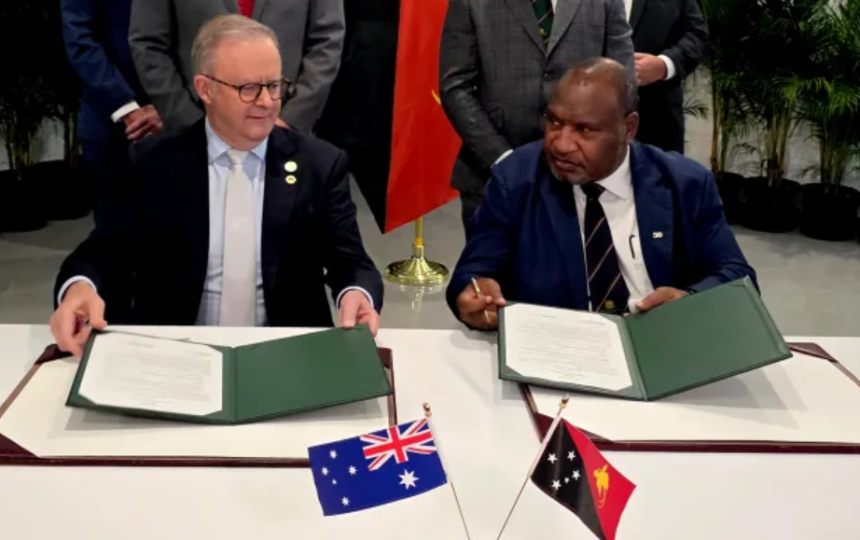Background: Growing Strategic Competition in the Pacific
Australia and Papua New Guinea (PNG) are accelerating efforts to deepen security ties as concerns mount over China’s expanding influence in the Pacific. Over recent years, Beijing has invested heavily in infrastructure, lending, and bilateral deals across island nations. Many in the region — including Australia — view this as part of a broader push by China to gain strategic advantages through soft-power, economic dependency, and potential military or policing agreements.
What The Proposed Treaty Would Do
The planned defence agreement—often referred to as the Pukpuk Treaty—would commit Australia and PNG to mutual defence: effectively pledging that an attack on one would demand a response from the other. Key features reportedly include:
- Integrated military cooperation, interoperability of forces and strategic assets.
- Allowing citizens of one country to serve in the other’s armed forces. In the case of PNG citizens serving in the Australian Defence Force (ADF), Australian citizenship has been discussed as an incentive.
- Joint training, exercises, and cooperation in areas like cybersecurity.
- Provisions to ensure that agreements with third parties do not compromise the ability of either party to carry out the treaty. This clause is interpreted as being relevant to avoid entanglements that could weaken the treaty’s mutual defence promise.
Delay & Current Status
Although Australian Prime Minister Anthony Albanese and PNG Prime Minister James Marape had planned to formally sign the treaty during the 50th anniversary of PNG’s independence, the signing was delayed. PNG’s cabinet did not meet the required quorum. Instead, the two nations signed a defence communique reaffirming their commitment to finalise the treaty following their internal processes.
Both leaders emphasized that the delay was procedural rather than a rejection of the treaty’s substance. Marape insisted that China had not interfered in the process.
What This Means in the Context of China’s Pacific Strategy
- Strengthening Australia’s Regional Role
For Australia, deepening defence partnerships with its Pacific neighbours is a strategic priority to maintain influence, offer alternatives to Chinese investment, and ensure security in its near-oceans. The treaty with PNG would mark Australia’s first major military alliance beyond its longstanding ones with the U.K. and U.S. in over 70 years. - PNG’s Balancing Act
PNG seeks enhanced security cooperation and capacity building, which Australia can deliver. However, PNG also has to balance its sovereign interests: rejecting perceptions it is aligning solely with any single power, maintaining independence in decision-making, especially relating to other partnerships. The treaty includes clauses intended to protect its autonomy. - Signal to China and Other Regional Players
The move is interpreted by analysts as part of a broader pushback against China’s increasing presence in the Pacific. With China’s policing deals with island nations, infrastructure loans, and diplomatic overtures, states in the region are under selective pressure. The treaty signals that Australia is willing to formalize its role in regional security.
Challenges & Concerns Ahead
- Ratification and Political Buy-in: The treaty’s effectiveness depends on PNG’s domestic political support and Australian follow-through. Cabinet approval, parliamentary ratification, and clarity of terms will be crucial.
- Sensitivity of Exclusivity: Some are worried that mutual defence pacts could limit PNG’s ability to form relationships with other partners, including China. Managing perceptions will be as important as the treaty’s text.
- Sovereignty & Operational Details: How “military attack” is defined, what triggers the mutual defence, how forces will operate, roles in joint command or decision-making—all these need clear definitions. Any ambiguity could lead to disputes or unintended obligations.
- Regional Reactions: Smaller Pacific nations, Indonesia, and others may see such alliances with concern or misgivings, especially if they believe it shifts regional power balances or prompts rivalry.
What’s Next
- Australia and PNG plan to complete their internal approval processes and then formally sign the treaty.
- The treaty’s passage will likely become a focus at PNG’s independence celebrations and associated diplomatic events.
- Analysts will be watching carefully for how operational integration unfolds: joint exercises, combined command structures, personnel exchange, and how it affects Australia’s broader Pacific Strategy.











